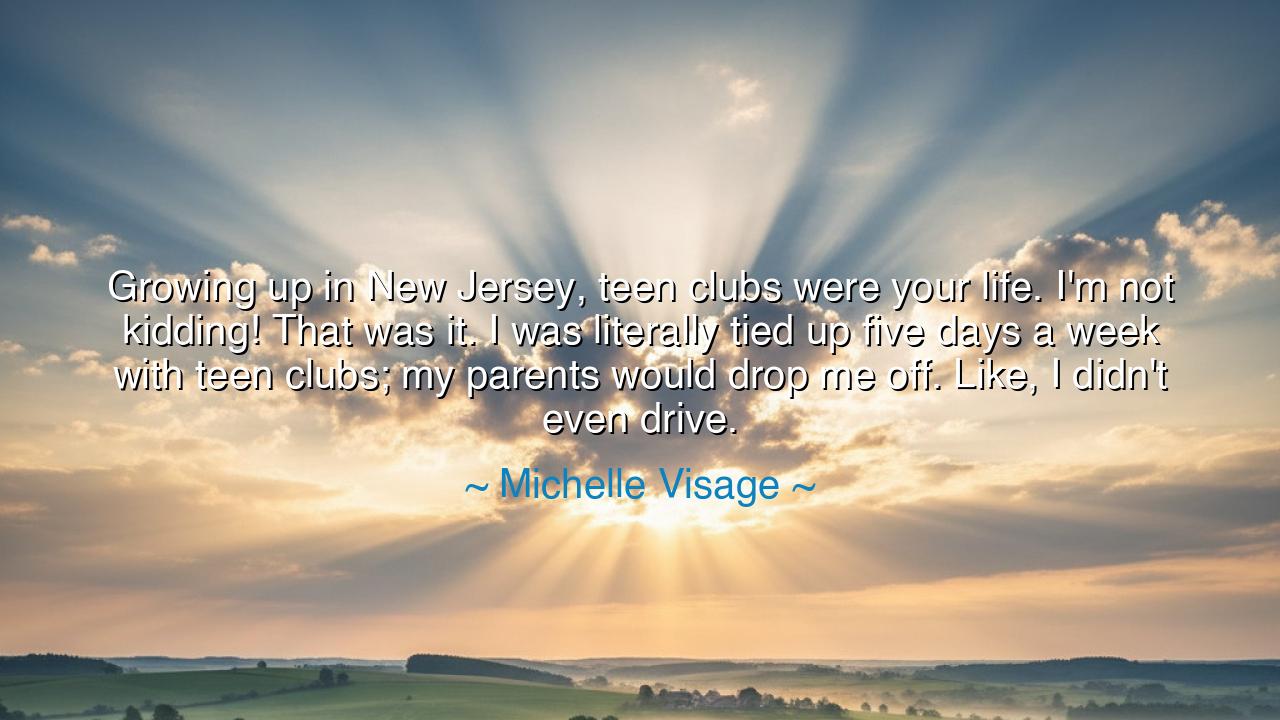
Growing up in New Jersey, teen clubs were your life. I'm not
Growing up in New Jersey, teen clubs were your life. I'm not kidding! That was it. I was literally tied up five days a week with teen clubs; my parents would drop me off. Like, I didn't even drive.






Hearken, O children of the ages, to the vivid recollections of Michelle Visage, who speaks of the teen years spent in the lively crucible of New Jersey’s teen clubs. She recalls a life consumed by these gatherings, five days a week, where the rhythm of youth pulsed through music, dance, and camaraderie. In her words, we perceive an ancient truth: adolescence is a season of intense social immersion, where the bonds forged in shared spaces shape character, passion, and identity for years to come.
Since the dawn of human society, youth have sought spaces apart from the world of elders, sanctuaries where they might explore identity and companionship. In the amphitheaters of ancient Greece, young men and women gathered for festivals, athletic contests, and dramatic performances, immersing themselves in collective experience. Michelle Visage’s teen clubs are a modern echo of these ancient rites: spaces where energy, enthusiasm, and social learning converge, providing structure, purpose, and a stage for self-expression.
Consider the story of the young Wolfgang Amadeus Mozart, who, in the bustling courts of Salzburg and Vienna, spent countless hours performing, rehearsing, and engaging with fellow musicians. Though bound by the discipline of daily practice, he thrived in these social and artistic circles, absorbing lessons, honing skill, and cultivating creativity. Like Visage, he experienced youth not as idle time, but as intense immersion in a vibrant, structured social ecosystem that would shape his life.
Her reflection illuminates the duality of freedom and guidance in adolescence. Though tied to clubs and schedules, Visage thrived, guided by her parents and inspired by her peers. The discipline of routine, coupled with spaces for social engagement, fosters resilience, creativity, and a deep understanding of self and community. Even without the independence of driving or self-directed travel, the young mind can flourish when immersed in meaningful collective activity.
The lesson extends beyond social entertainment. Participation in such communal spaces cultivates social intelligence, empathy, and skill, whether in dance, art, or conversation. These clubs were more than leisure—they were laboratories for human interaction, arenas where conflict, cooperation, creativity, and leadership were rehearsed in microcosm. In this, adolescence becomes a time not only of fun but of essential preparation for the complexities of adult life.
Practical guidance emerges from Visage’s experience. Seek out communities and spaces that encourage engagement, learning, and shared passion. Commit to participation with diligence and openness, embracing both discipline and delight. Whether through clubs, teams, artistic groups, or collaborative projects, immerse yourself in the collective energy of peers, for it is here that social skill, confidence, and identity are forged.
Her words also remind us of the value of mentorship and support. Visage’s parents provided transportation and structure, ensuring that her engagement was sustained and safe. In every era, guidance from elders and caretakers transforms youthful enthusiasm into productive experience, allowing the young to explore, learn, and grow while remaining anchored in wisdom.
Thus, heed the eternal teaching of Michelle Visage: adolescence is a crucible of energy, connection, and structured exploration. Embrace the spaces, routines, and communities that inspire growth, creativity, and friendship. In doing so, the seemingly ordinary rhythms of youth become a foundation for lifelong skill, passion, and resilience, revealing that the heart of teen experience is not mere pastime, but the forge of identity, artistry, and human connection.






AAdministratorAdministrator
Welcome, honored guests. Please leave a comment, we will respond soon